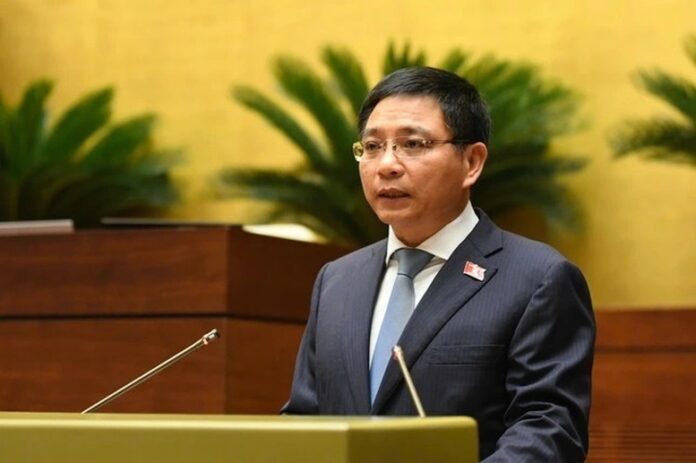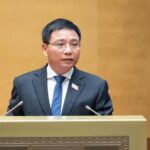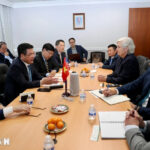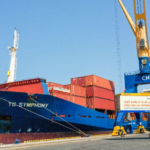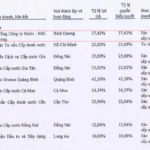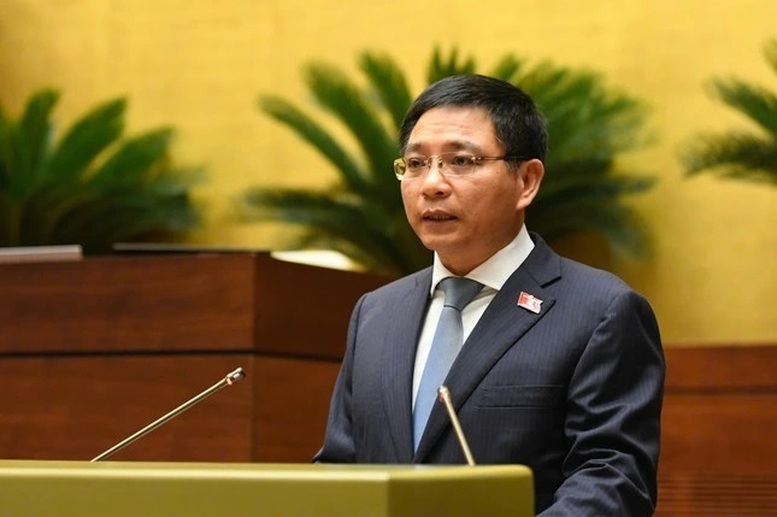
Minister Nguyen Van Thang: Vietnam is a bright spot in economic development and growth, with macroeconomic stability.
Attracting International Capital
On June 11th, at the National Assembly, authorized by the Prime Minister, Minister of Finance Nguyen Van Thang presented the draft resolution of the National Assembly on the International Financial Center in Vietnam.
Minister Nguyen Van Thang emphasized that Vietnam is currently a bright spot in economic development and growth, with macroeconomic stability.
Taking advantage of competitive strengths to form a financial center will help Vietnam connect to the global financial market, attract foreign financial organizations, and seize the opportunity to shift international investment capital.
This will also promote the efficient development of Vietnam’s financial market, keeping up with international standards, and contributing to sustainable economic development, enhancing Vietnam’s role, position, prestige, and influence on the international stage.
The purpose of establishing an International Financial Center is to attract international capital to serve three breakthrough strategies, traditional growth drivers, and new growth drivers. It also aims to develop high-quality financial services, test and manage new markets as dictated by reality.
Additionally, it will contribute to forming a high-quality workforce, connecting with the global economy, and elevating Vietnam’s position in the global financial market, thereby promoting the country’s economic development.
Minister Nguyen Van Thang mentioned that there are 13 specific policies to be applied in the International Financial Center.
These include foreign exchange, banking activities, finance, capital market development, taxation, entry, exit, residence, labor for experts and investors, employment and social welfare, land, construction and environment, controlled trials for fintech and innovation, field-based incentives and policies for strategic investors, infrastructure development technical and social infrastructure, export, import, and distribution of goods and services, fees and charges, and dispute resolution in investment and business activities.
The draft resolution stipulates certain necessary administrative procedures to implement the mechanisms and specific policies in the operation and development of the International Financial Center. The content of the administrative procedures is designed to be simple and create the most favorable conditions for organizations and individuals participating in the development of the International Financial Center.
Based on the provisions of the draft resolution, during the process of drafting the detailed guiding documents, the Government will continue to review and streamline the administrative procedures, as reported by Minister of Finance to the National Assembly.
Minister Nguyen Van Thang also stated that the draft resolution introduces regulations to promote decentralization between central and local government agencies. For instance, it allows the Government to issue decrees to handle issues that arise differently from the legal documents of the National Assembly and the Standing Committee of the National Assembly.
The management agency of the International Financial Center is authorized to decide on the use of local budget investment development capital to support the construction of housing for employees working in the International Financial Center…
Center Members Can Borrow in Foreign Currency
The Government informed that the draft resolution stipulates some specific policies on the liberalization of accounts and foreign exchange, along with the application of international standards in foreign exchange transactions, combined with a transparent reporting system.
Specifically, regarding foreign exchange policies, the draft resolution states that members are allowed to use foreign currency for payment, money transfer, listing, advertising, pricing, and valuation for activities and services between members and between members and foreign organizations and individuals.
The resolution distinguishes between the borrowing and lending activities of the center’s members: They can borrow in foreign currency from foreign organizations and individuals and must comply with the reporting and information disclosure regime under current laws on foreign exchange management and foreign borrowing by enterprises. They are also allowed to borrow in foreign currency from member credit institutions and foreign bank branches and lend in foreign currency to organizations in the rest of Vietnam.
To ensure macroeconomic stability and national financial security, the draft resolution stipulates that organizations in the rest of Vietnam borrowing from the International Financial Center members must comply with the Government’s regulations on conditions, objects, purposes, and registration of borrowing.
The resolution stipulates that members of the International Financial Center, which are 100% foreign-owned, can enjoy superior mechanisms and are not subject to administrative procedures related to foreign exchange management for investment and lending activities from the International Financial Center abroad (but must still open accounts and report) to ensure alignment with the goal of attracting foreign investment capital into the International Financial Center.
Members of the International Financial Center established by foreign investors are permitted to convert foreign currency according to the Government’s regulations.
Regarding banking activities, the draft resolution clearly states the commercial presence of members of the International Financial Center and the forms of banking activities within the center, including Joint Stock Commercial Banks with 100% foreign-owned capital and foreign bank branches.
It stipulates the application of accounting and financial standards, minimum capital adequacy ratios, liquidity ratios, and debt classification, provisioning, and utilization for members of the International Financial Center, corresponding to each type: Joint Stock Commercial Banks with 100% foreign-owned capital or foreign bank branches (applying the policies of the parent bank in accordance with international practices); Joint Stock Commercial Banks with 100% domestic-owned capital (applying the owner’s policies in line with international practices and the roadmap stipulated by the Government).
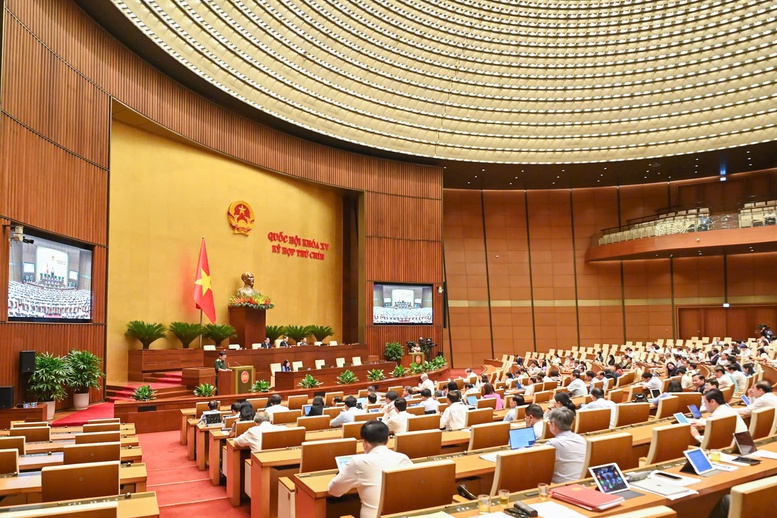
The National Assembly learns about the role and significance of the International Financial Center
To attract investment and high-quality human resources to work at the International Financial Center, the draft resolution stipulates tax incentives, such as a corporate income tax rate of 10% for 30 years, with an exemption for the first four years and a 50% reduction for the next nine years. It also includes personal income tax exemption for high-quality human resources and preferential taxes for many services and transactions at the International Financial Center.
Notably, the draft resolution states that members of the International Financial Center are allowed to establish trading floors and trading platforms operating within the center, such as commodity and commodity derivative trading, carbon credit trading, cultural and artistic product trading, trading of precious metals, securities trading of innovative startups, green financial product trading, specialized trading floors, and other types of new trading platforms as demanded by development.
One International Financial Center Located in Two Cities
In the report reviewing the draft resolution of the National Assembly on the International Financial Center in Vietnam, the reviewing agency proposed considering several issues to perfect the policies.
Mr. Phan Van Mai, Chairman of the National Assembly’s Committee for Economic Affairs and Finance, suggested that the draft resolution should ensure its constitutionality and properly institutionalize the Resolutions and Conclusions of the Politburo. The policies should be breakthrough and not follow the existing framework. Vietnam, as a latecomer, should learn from the successful experiences of other countries and avoid their failures to create international competitiveness.
There should be a reasonable mechanism for state management and supervision, providing flexibility while ensuring risk management and maintaining financial security, political stability, and social order and safety.
Specifically, the Committee for Economic Affairs and Finance proposed that the drafting agency evaluate clearly: With the groups of policies in the draft, are there enough prerequisites to create a legal framework for the formation and operation of the International Financial Center in Vietnam? Are the regulations attractive and competitive enough?
“It is necessary to clarify which policies are considered superior and unique to Vietnam,” said the Chairman of the Committee for Economic Affairs and Finance.
Regarding specificity, according to the Chairman of the Committee for Economic Affairs and Finance, the operation of the International Financial Center in Vietnam is a new issue. Therefore, the resolution should only stipulate general issues, principles, and stable and clear contents. The Government and the Prime Minister, within their competence, should issue detailed guides to ensure flexibility and timeliness. The two cities (Ho Chi Minh City and Danang) should be delegated with contents related to their functions, tasks, and local authority to ensure initiative, flexibility, and creativity in accordance with the law.
Regarding the scope and principles of application of law: Clause 4, Article 6, on the application of law, the draft resolution stipulates: “In the process of implementing this Resolution, the Government shall issue decrees to handle issues that arise differently from the laws, resolutions of the National Assembly, and ordinances of the Standing Committee of the National Assembly and report to the National Assembly at the nearest session.”
“The Committee for Economic Affairs and Finance agrees with this policy but also proposes that the issuance of the regulations mentioned in Clause 6, Article 6 of the draft resolution must ensure the following principles: Strict compliance with the regulations in Decision No. 178-QD/TW dated June 27, 2024, of the Politburo on controlling power and fighting corruption and negativity in law-making activities; Ensuring constitutionality and legality in issuing regulations; Ensuring feasibility, timeliness, objectivity, and protection of national interests, and the legitimate rights and interests of the people, businesses, and related subjects; Ensuring the conditions for implementation regarding the issued regulations, with a focus on resource capacity, including the balance of the state budget and local budgets; Complying with the regulations on impact assessment, policy consultation in policy-making to ensure that the regulations do not negatively affect socio-economic development, the environment, and people’s lives but bring practical benefits to the country; Clearly defining the responsibilities of organizations and individuals in issuing regulations that differ from current laws, ensuring compliance with the principle of matching rights and responsibilities,” expressed the Chairman of the Committee for Economic Affairs and Finance.
Regarding the authority to establish and the establishment of one International Financial Center in two cities, the Committee for Economic Affairs and Finance proposed clarifying the model, relationship, and independence between the two bases in two locations and the state management agency for these two bases. It is also necessary to consider the specific characteristics of each city (Ho Chi Minh City and Danang).
At the same time, the resolution can stipulate general policies, but the laws and decrees should have corresponding regulations to promote the potential and strengths of each base. There should be coordination mechanisms to achieve overall effectiveness and enhance management and control to ensure fair competition.
VinFast Sells Nearly 11,500 Cars in May: A Powerful Surge for the Sales Leader
VinFast continues its remarkable journey, solidifying its position as the leading automotive brand in the market. With an impressive total of 56,187 vehicles sold so far this year, VinFast is revolutionizing the industry and captivating customers with its innovative and dynamic offerings.
The Heartbreak of Million-Dollar Shophouses: Sky-High Prices, Easy to Buy but Hard to Sell, Left Vacant and Longing for Tenants
Shophouses, once hailed as the golden goose of real estate, are now facing a challenging reality. Once touted as a lucrative investment, these commercial townhouses are witnessing a shift in fortunes. Low rental yields and an increasing number of vacant units paint a different picture today.


























